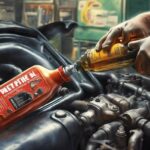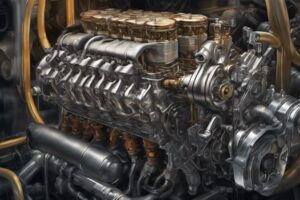If your car is underperforming and jerking while accelerating, this can be a frustrating experience for any driver. Sometimes, this can be accompanied by a check engine light, which can make diagnosing the problem a lot easier. However, what if your car is jerking when accelerating, and there is no check engine light?
There are several possible reasons why your car may be jerking when accelerating, even if there is no check engine light. Some common causes include dirty fuel injectors, a blocked catalytic converter, worn-out spark plugs, a dirty air filter or problems with the fuel system.
In this article, we will explore some of the possible reasons why your car may be jerking when accelerating, even if there is no check engine light.
Why Is My Car Jerking When Accelerating With No Check Engine Light?
There are many reasons why there can be a problem with the power output of your engine that causes hesitation or jerking. Usually it comes down to a lack of sufficient air, fuel or suitable ignition that leads to engine misfires and jerking.
If your car jerks when accelerating with no check engine light, it’s important to understand the symptoms.
If your car jerks or shudders while accelerating, it could be due to a number of issues such as dirty fuel injectors, which can cause the engine to misfire. Another possible cause is a blocked catalytic converter and this can cause a lack of power leading to jerking or shuddering.
If your car experiences a loss of power during acceleration, it could also be due to a faulty mass airflow sensor, which can cause the engine to receive incorrect readings and result in a lack of power. Another possible cause is a clogged fuel filter, which can restrict fuel flow and lead to a loss of power during acceleration.
If your car stalls while accelerating, it could be due to several issues. Such as a problem with the vehicle charging system or a faulty ignition coil, which can cause the engine to misfire and stall.
Here are some of the most common reasons explained in more detail:
Cause 1. Dirty Fuel Injectors
Yes, bad fuel injectors can cause a car to jerk with no check engine light. Fuel injectors are responsible for delivering fuel to the engine’s combustion chamber in a precise and controlled manner. If the fuel injectors are clogged, dirty, or malfunctioning, they may not be able to deliver fuel at the correct rate, causing the engine to run poorly and jerk during acceleration.

In some cases, a bad fuel injector may not trigger a check engine light, especially if the issue is intermittent or not severe enough to trigger the vehicle’s diagnostic system.
Other symptoms of bad fuel injectors include rough idling, reduced power, poor fuel economy, and engine misfires. If you suspect that your car’s fuel injectors are causing jerking or other issues, it is recommended to have them tested to determine if they are the cause of the problem.
Cause 2. Faulty Oxygen Sensors
Another possible cause of a jerking car when accelerating is a faulty oxygen sensor. Oxygen sensors are responsible for measuring the amount of oxygen in the exhaust gases and sending this information to the engine control unit (ECU). The ECU uses this information to adjust the air-to-fuel ratio and ensure optimal performance and efficiency.

If the oxygen sensors are malfunctioning or sending inaccurate readings to the ECU, it can affect the air-to-fuel ratio and cause the engine to run poorly, resulting in jerking or hesitation during acceleration.
In some cases, a bad or dirty oxygen sensor may not trigger a check engine light, especially if the issue is intermittent or the sensor voltage is not completely out expected range.
Other symptoms of bad oxygen sensors include reduced power, poor fuel economy, rough idling, and increased emissions.
Cause 3. Clogged Air Filter
A clogged air filter can also cause your car to jerk when accelerating. Air filters are responsible for preventing dirt and debris from entering your engine.

If the air filter is dirty or clogged, it can restrict the amount of air that enters the engine, which can affect the air-to-fuel ratio and cause the engine to run rich, resulting in jerking or hesitation during acceleration.
In most cases, a bad air filter will not trigger a check engine light, especially if the issue is not severe enough to stall the engine or cause a misfire.
A bad air filter can also lead to reduced power, poor fuel economy, rough idling, and increased emissions.
Cause 4. A Faulty Mass Airflow Sensor
A bad MAF (Mass Air Flow) sensor can often cause a car to jerk with no check engine light. The MAF sensor is responsible for measuring the amount of air entering the engine and sending this information to the engine control unit (ECU).

The ECU uses this information to adjust the air-to-fuel ratio to ensure optimal performance and efficiency.
If the MAF sensor is dirty or failing, or sending inaccurate readings to the ECU, it can affect the fuel mixture and cause the engine to run poorly, resulting in jerking or hesitation during acceleration.
In some cases, a bad MAF sensor may not trigger a check engine light if the engine is not performing badly enough. There may be error codes such as P0101 stored in the ECU if the problem is happening intermittently.
Could a Fast Camaro Cause Car Jerking on Acceleration Without Check Engine Light?
A fast Camaro from the fastest camaros speed comparison might cause car jerking on acceleration without the check engine light. Several reasons could be behind this issue, including ignition problems, fuel system issues, or transmission problems. It’s essential to have a professional mechanic diagnose and address the problem promptly.
Can LED Headlight Issues Cause Car Jerking on Acceleration Without a Check Engine Light?
Yes, the car’s adaptive LED headlights can cause jerking on acceleration without triggering the check engine light. If the headlights are malfunctioning or causing electrical disturbances, it can disrupt the car’s computer system and lead to performance issues without any warning lights being illuminated.
Cause 5. Bad Spark Plugs
Bad spark plugs are another common reason for a car to jerk with no check engine light. Spark plugs are responsible for igniting the air-fuel mixture in the engine’s cylinders hundreds of times per minute.

If the spark plugs are worn, damaged, or contaminated, they may not be able to generate a strong enough spark to ignite the air-fuel mixture properly, causing the engine to run poorly and jerk during acceleration.
In most cases, worn out spark plugs won’t trigger a check engine light. You will often only see symptoms such as reduced power, poor fuel economy, rough idling, and engine misfires. To properly diagnose bad spark plugs, they need to be removed and inspected.
Can Engine Power Reduction in Chevy Malibu Cause Jerking on Acceleration Without a Check Engine Light?
If you have experienced jerking on acceleration in your Chevy Malibu without a check engine light, it could be due to engine power reduction. A class action filed chevy malibu’s owners have reported similar issues, potentially pointing to a widespread problem. It’s important to have the vehicle inspected by a qualified mechanic.
Could a Bad Alternator Cause my Car to Jerk on Acceleration Without Triggering the Check Engine Light?
A bad alternator causing check engine light is possible, especially if it is not charging the electrical system properly. This can lead to voltage fluctuations, causing the car to jerk on acceleration. However, there could be other reasons too, so it’s essential to have the car properly diagnosed by a mechanic.
What Next – Car Jerks When Accelerating No Check Engine Light
If your car is jerking when accelerating but there is no check engine light, it can be difficult to pinpoint the root cause as there may not be any engine error codes available.
However, there are several diagnostic tests that can help you identify the issue. Here are some of the most common tests:
1. Start With A Visual Inspection
The first step is to perform a visual inspection of your car’s engine components. Look for any obvious signs of wear and tear, such as cracked hoses, loose wires, or corroded connections.
Check the condition of the spark plugs and ignition coils, and make sure the air filter is clean. If you notice any issues during the visual inspection, address them before moving on to more advanced diagnostic tests.
2. Carry Out An OBD-II Diagnostic Test
An OBD-II scanner can be used to read the diagnostic trouble codes (DTCs) stored in your car’s computer. These codes can provide valuable information about the specific issue causing the jerking.
Some common DTCs associated with jerking while accelerating include misfires, oxygen sensor problems, and fuel system issues.
3. Perform A Fuel Pressure Test
A fuel pressure test can help you determine if the jerking is caused by a fuel system issue. This test measures the pressure of the fuel in the system (usually at the fuel rail) and compares it to the manufacturer’s specifications.
If the pressure is too low, it will cause the engine to hesitate or jerk during acceleration. A fuel pressure test may also help you to identify issues with the fuel pump, fuel injectors or fuel filter.
4. Test The Ignition Coils
The ignition coils are responsible for providing power to the spark plugs that ignite the fuel in the engine. If one or more of the coils are malfunctioning, it can cause the engine to misfire or jerk during acceleration.
To test the ignition coils, you can use a multimeter to measure the resistance of each coil. If the resistance is outside of the manufacturer’s specifications, it may be time to replace the coils.
5. Perform A Compression Test
A compression test can help you determine if the jerking is caused by a leak in one or more cylinders. This test measures the compression of each cylinder and compares it to the manufacturer’s specifications.
If the compression is too low, this can affect well the fuel mixture is burnt and it can cause the engine to hesitate or jerk during acceleration. A compression test can also help you identify issues with the piston rings, valves, or cylinder head.
6. Fuel System Cleaning
Over time, dirt, debris, and other contaminants can build up in the fuel system and cause issues with acceleration.
To fix this issue, you may need to clean your fuel system. You can do this by using a fuel system cleaner that you add to the fuel tank before driving the car for 20 to 30 miles.
Fuel cleaning additives can help to break down any build-up in the fuel system and this can improve the performance of your car.
7. Oxygen Sensor Inspection And Replacement
The oxygen sensors are located on the exhaust with at least two fitted to most cars, one before and one after the catalytic converter. Checking the oxygen sensors involves checking the condition of the sensor wiring and connector.
It can be difficult to see visible damage to the sensor filament, so running an live diagnostic is often a better way to determine if the oxygen sensor readings are out of range.
8. Air Filter Replacement
A clogged or dirty air filter can also cause issues with acceleration. Since a dirty air filter restricts the flow of air to the engine, this can cause a decrease in performance. Remove and check the condition of the air filter and change it if necessary.
9. Mass Airflow Sensor Replacement
If you suspect a problem with the mass air flow sensor, then you should try cleaning it first as a temporary solution, with a proper electrical contact cleaner. If you notice an improvement in performance then changing the sensor for a new one may solve the problem permanently.
If you have the proper diagnostic equipment, then testing the MAF before replacing is a good idea. Readings are usually taken when idling and then at 2500rpm and compared to manufacturer specifications.
10. Spark Plug Examination And Replacement
To check for bad spark plugs, you can perform the following steps:
- Remove one spark plug at a time using a spark plug socket.
- Inspect the spark plug for signs of wear, damage, or fouling. A good spark plug should have a clean, white or light gray insulator. If the insulator is black, oily, or covered in debris, the spark plug may be fouled or worn. If the insulator is white or blistered, the spark plug may be overheating.
- Check the gap between the spark plug electrodes using a spark plug gap gauge. The gap should be set to the manufacturer’s specifications, which can be found in the owner’s manual or online.
If you notice any signs of wear, damage, or fouling, or if the gap is not set correctly, it is recommended to replace the spark plugs. Replacing the spark plugs can often fix engine misfires and jerking.
FAQ
1. What is engine bucking?
Engine bucking is a term used to describe a sudden and repetitive jerking or jolting motion of the vehicle while driving. It can feel like the vehicle is hesitating or momentarily losing power before suddenly accelerating again, causing a jolt or lurching motion. u003cbru003eEngine bucking can occur during acceleration or at a steady speed, and it may be accompanied by a clunking or banging noise. It can be caused by a variety of issues, including a clogged fuel filter, a malfunctioning fuel pump, a faulty ignition system, a bad oxygen sensor, or a worn transmission.
2. Why does my automatic car jerk at low gears?
If your automatic car is jerking at low gears, it could be caused by a few different issues. u003cbru003e1. Dirty or clogged transmission fluid: Over time, transmission fluid can become dirty or clogged with debris, which can prevent it from flowing smoothly through the transmission. This can cause the car to jerk or hesitate when shifting into low gears.u003cbru003e2. Worn transmission parts: If the transmission is worn or damaged, it may not be able to shift smoothly into low gears, causing the car to jerk or hesitate.u003cbru003e3. Faulty torque converter: The torque converter is responsible for transmitting power from the engine to the transmission. If it is malfunctioning, it can cause the car to jerk or hesitate when shifting into low gears.u003cbru003e4. Malfunctioning shift solenoid: The shift solenoid is responsible for controlling the flow of transmission fluid and shifting the gears. If it is malfunctioning, it can cause the car to jerk or hesitate when shifting into low gears.u003cbru003e5. Low transmission fluid: If the transmission fluid level is low, it can cause the transmission to shift poorly, resulting in jerking or hesitation when shifting into low gears.u003cbru003e
As an Amazon Associate we earn from qualifying purchases.









I’ve noticed my car jerking when I accelerate, but there’s no check engine light indicating a problem. Given the potential issues you’ve outlined, could you recommend a specific order of diagnostic tests I should perform to efficiently diagnose the root cause of this jerking?
I’ve noticed my car has been jerking when I accelerate, and there isn’t any check engine light activated. Could this issue still be related to something within the fuel system, even without the light indicating a problem?